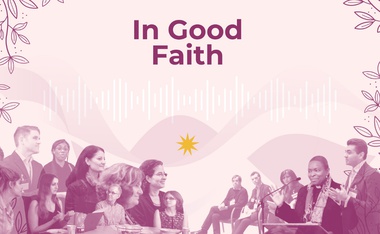In the realm of contemporary discourse, how often do we ponder the intricate interplay between religion and media? It is a question poised to evoke a myriad of reflections, especially as we navigate through the complexities of modern society. The United Kingdom has recently unveiled a new podcast that delves into this enchanting relationship, illuminating the nuances of how spiritual teachings resonate within the framework of media. As we embark on this exploration, it is imperative to consider not only the insights offered by such a podcast but also the challenges and opportunities it presents for both believers and seekers alike.
The genesis of this podcast is rooted in the Bahá’í principle of unity—an idea that transcends geographical and ideological boundaries, finding its expression in the digital age through varied platforms. By probing the multifaceted relationship between religion and media, the podcast encourages listeners to reflect upon how media can serve as a conduit for spiritual education and the dissemination of religious values. This dialogue is particularly salient in an era where misinformation can easily proliferate, necessitating critical engagement with the narratives that shape our understanding of faith.
A salient theme within the podcast is the societal transformation occurring through the lens of media. Historically, religious teachings have relied on direct forms of communication—sacred texts, community gatherings, and oral traditions. However, as we survey the contemporary landscape, it becomes clear that media, in its myriad forms, has revolutionized the way messages are conveyed and absorbed. New platforms allow for the rapid sharing and discussion of ideas, facilitating a broader reach than traditional methods could ever aspire to achieve.
However, this rapid dissemination also poses significant challenges. One cannot ignore the precariousness that accompanies such a dichotomy; as positive messages proliferate, so too can distortions of truth and divisive rhetoric emerge. The challenge thus lies in discerning the authentic essence of religious teachings amidst a cacophony of competing narratives. How do we, as listeners and participants in this dialogue, navigate the tension between genuine engagement and the superficial allure of sensationalism?
Moreover, the Bahá’í teachings emphasize justice, equity, and the importance of diverse perspectives. The podcast explores how media can either elevate or undermine these principles. Are platforms like social media fostering greater understanding among different faith traditions, or are they creating echo chambers that solidify pre-existing biases? Such inquiries demand rigorous introspection and a commitment to cultivating an environment of respect and learning—one that celebrates the richness of diverse beliefs while acknowledging their potential for misunderstanding and conflict.
Furthermore, the role of technology cannot be understated. As the podcast elaborates, advancements in technology have dramatically altered the landscape of religious interaction. From virtual congregations to interactive forums, technology offers unprecedented opportunities for engagement. Yet, this shift necessitates a critical examination of the implications of such changes. What does it mean for the authenticity of religious experience in a virtual space? Do online discussions retain the vitality of face-to-face interactions, or do they fall short of conveying the profundity of spiritual fellowship? Such questions surface the complexities intrinsic to modern religious practice.
As the podcast invites listeners to reflect deeply on these themes, it also highlights the importance of interdisciplinary dialogue. Religion and media intersect with various societal dimensions—sociology, psychology, and cultural studies, to name a few. This convergence underscores the necessity for collaborative discourse, pushing us beyond theological confines and urging an integrative approach to understanding the human experience. Engaging with diverse academic lenses enriches our comprehension of how religious identity is constructed and expressed through media.
The podcast’s exploration extends to the ethical implications of media consumption and production. It asks listeners to consider their role not just as consumers of information, but as active participants in the creation and sharing of meaningful content. This shift from passive consumption to active engagement represents a paradigm change in our relationship with media. Are we contributing to the spiritual discourse in a way that aligns with the core teachings of our faith? Are we amplifying voices that may otherwise remain unheard, particularly in contexts where marginalized perspectives are silenced? The podcast challenges its audience to embrace responsibility in their interaction with media, advocating for a conscientious approach that reflects the values of equity and inclusion.
As listeners delve into the various episodes, they encounter a tapestry woven with voices of faith leaders, scholars, and laypersons. Each contribution enriches the dialogue and fosters a community of inquiry—one that encourages mutual respect and curiosity. The podcast becomes not merely a source of information but a platform for transformative learning, prompting discussions that extend beyond the auditory realm and engage participants in meaningful action.
In conclusion, the introduction of this podcast in the United Kingdom serves as an invitation to explore the intricate relationship between religion and media. It challenges us with questions that are not easily answered, urging a critical examination of our roles within this dynamic landscape. By embracing the complexity of these interactions and striving for an authentic and equitable discourse, we can aspire to enrich our understanding of spirituality in the modern world. In navigating this space, we not only honor the teachings of our faith but also contribute to a broader conversation that transcends barriers and fosters unity in diversity.
